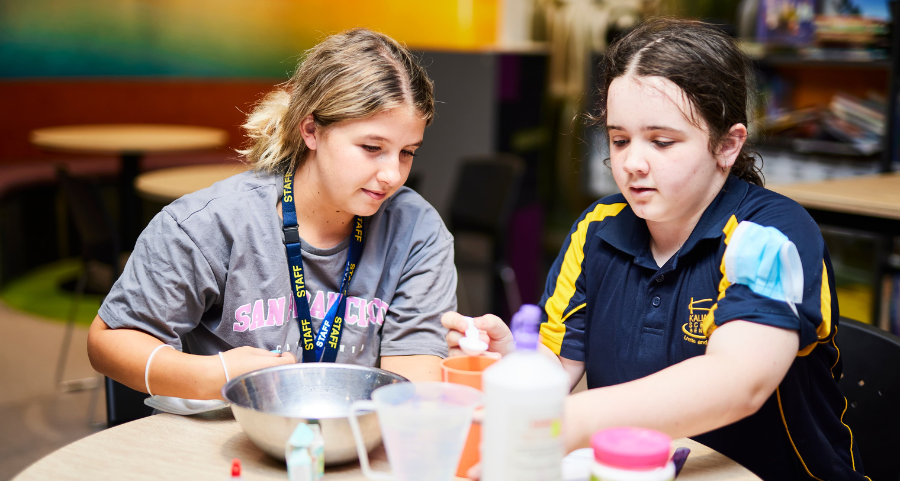Do you have what it takes to work at OSHC?
Welcome to the world of Outside School Hours Care (OSHC) at Lifely! If you’re considering a career in OSHC or have recently joined our team, you’re in for a rewarding experience. In this blog, we’ll walk you through a typical shift, your responsibilities, and the mandatory requirements for working in the OSHC team.
Explore our OSHC job vacancies
Download our toolkit: A Day in with Lifely’s OSHC Crew
A typical shift
Getting started
Your OSHC journey begins when you arrive for your shift. To ensure a smooth start, we recommend researching the school where you’ll be working. Parking at schools can sometimes be a bit chaotic, so plan to arrive 10-15 minutes before your shift begins.
Dress comfortably and professionally; neat casual clothing like a polo shirt, clean, unripped jeans and covered shoes are suitable. Be prepared for the activities that might occur during your shift. If you know you’ll be engaging in sports or physical activities, wear running shoes and comfortable, loose clothing.
Remember, personal items stay in the staff area, and using your phone during your shift is considered unprofessional.
Once you’re on-site, sign into the Deputy app and report to your supervisor. This is the time to discuss the number of children attending, read the children’s profiles, set-up the planned activities, and go over any special notices for the day. You’ll be allocated an activity, whether it’s preparing afternoon tea, setting up a craft station, cooking, or facilitating sports activities.
Students arrive
As the students start arriving, greet them warmly and set a positive tone for the session. The sign-in process takes place, and some students, families, or school staff may need assistance with this task.
During the session
Engaging with the children is one of the most crucial aspects of working in OSHC. Position yourself at their level, ask open-ended questions, and show genuine interest. Active engagement means being involved in the activity, not just observing. Ensure you actively supervise the children, always watching, engaging, and ready to act.
Not sure how to start a conversation? Ask them about their day, point out the activities available, and offer support to help them participate.
Snack time
Be aware of the children’s dietary needs and supervise food preparation and serving. It’s vital to ensure children with allergies, intolerances, and special dietary requirements are not exposed to foods they should avoid.
Winding down
As the session progresses, things will start to slow down. Children may have a late afternoon snack, play board games, read, or watch a movie. This is an excellent time to transition to quieter indoor activities.
Packing up
As closing time approaches, it’s time to clean up and pack away.
Keep track of which children have gone home and who is still in your care. Communication with parents is crucial, so don’t forget to greet each parent or guardian and share information about the day.
Going home
Before leaving, let your colleagues know it’s the end of your shift. Check the details of your next shift and hand over any incidents or notes from the day. Sign out of the Deputy app and always remember to express your gratitude for the shift!
Explore our OSHC job vacancies
Your Responsibilities
At all times
Working in OSHC comes with various responsibilities to ensure the safety and wellbeing of the children in your care:
- Follow Lifely’s policies and procedures, including the Child Safe Policy and other relevant school policies.
- Please adhere to the National Quality Standards and My Time Our Place guidelines.
- Keep the OSHC room and activity spaces tidy and safe.
- Treat all children with dignity and respect, actively engaging them in planned and unplanned activities.
- Actively supervise the children and support overall service with supervision practices.
- Provide first aid assistance to injured or unwell children and contact guardians when necessary.
- Collaborate professionally with other educators and support workers.
- Maintain communication with service and school educators to report incidents or issues.
- Consistently record reflection journal entries and observations.
- Interact with parents and guardians in a friendly manner.
- Assist with the preparation and serving of food.
- Report any feedback or incidents to Lifely as per policy and procedures.
Supervising children outside
When supervising children outdoors, follow these guidelines:
- Ensure children stay within designated boundaries.
- Encourage children to be sun-smart by wearing a hat and sunscreen as required.
- Position yourself where you can see all the children in your group.
- Always scan the area while engaging with the children.
- Use walkie-talkies for communication if provided, especially when children are moving indoors.
- When accompanying children to the bathroom, ensure that you follow both the policy and the child’s specific needs.
Supervising children on excursions
When on excursions, these guidelines are crucial:
- Be responsible for a designated group of children.
- Conduct head counts every 10-15 minutes or when transitioning between spaces.
- Monitor children during bus rides and movements between locations
- When accompanying children to the bathroom, ensure that you follow both the policy and the child’s specific needs.
- Arrange for another staff member to watch your group if you need to use the bathroom.
Child safety and wellbeing
Sadly, children with disabilities face a higher risk of experiencing abuse due to various vulnerabilities associated with their disabilities, making it imperative to ensure their safety and protection.
As OSHC workers in Victoria, you are mandatory reporters under Victorian law, and it is your legal duty to report any concerns regarding child safety and wellbeing.
You will be required to follow Lifely’s Child Safe policy and procedures to make your report. You must also do the following:
- If you suspect a child’s safety or wellbeing is at risk, including family violence, neglect, or abuse, document your observations and concerns, noting the date, time, location, and specific incidents.
- Immediately inform your supervisor or a member of the OSHC leadership team. Share your documented information and any relevant context for guidance on reporting procedures.
- If there is immediate danger, contact Child Protection Services or the police. In Victoria, reach out to the Department of Families, Fairness and Housing (DFFH) Child Protection for assistance.
- Preserve the child’s and family’s privacy by following organisational and legal guidelines on confidentiality during the reporting process.
Explore our OSHC job vacancies
What makes a great OSHC worker?
Working as an OSHC worker is a rewarding endeavour, mainly when catering to children with diverse needs and disabilities. To excel in this role, possessing a set of key characteristics is essential.
- Patience: OSHC workers, especially when working with children with disabilities, must exhibit exceptional patience. They understand that each child progresses at their own pace and may require more time and support to engage in activities and express themselves effectively.
- Empathy: Demonstrating deep empathy towards children with disabilities is crucial. OSHC workers should be sensitive to their unique challenges and emotions, fostering a supportive and understanding environment.
- Communication: Strong communication skills are vital when working with children with disabilities. OSHC workers must adapt their communication styles to suit individual needs, ensuring clear understanding and engagement.
- Adaptability: Flexibility is critical in accommodating the diverse needs of children with disabilities. OSHC workers should be able to modify activities and approaches to provide an inclusive and enriching experience for all children.
- Inclusive: OSHC workers should actively promote inclusivity by creating an environment where children with disabilities feel valued and fully integrated. This involves adapting activities, providing necessary aids, and fostering peer support.
- Safety awareness: Ensuring the safety and wellbeing of all children, including those with disabilities, is paramount. OSHC workers must have a keen awareness of safety protocols and take additional measures to address specific needs or vulnerabilities.
- Compassion: Displaying compassion and understanding towards children with disabilities is essential. OSHC workers should provide emotional support, celebrate achievements, and help when required.
- Knowledge: OSHC workers should seek to acquire knowledge related to different disabilities, such as autism spectrum disorders, sensory processing disorders, or intellectual disabilities. This knowledge helps them tailor their support effectively.
- Collaboration: Collaborating with parents, caregivers, and specialists is crucial when working with children with disabilities. OSHC workers should maintain open lines of communication to ensure consistent care and support.
- Inclusive learning: OSHC workers must commit to creating inclusive learning environments where all children, regardless of their abilities, can thrive and develop essential life skills.
These characteristics collectively contribute to a successful OSHC worker, especially when working with children with disabilities. Their dedication to providing a nurturing, educational, and inclusive environment plays a pivotal role in the development and wellbeing of every child under their care.
Mandatory Requirements
To work in our OSHC team, you must meet the following mandatory requirements:
- NDIS Worker Screening Check
- Working with Children Check
- First Aid and CPR Certificates
- Mandatory Reporting Certificate
- NDIS Orientation Certificate
- Proof of Australian Citizenship or Eligibility to Work Visa
At Lifely, we are committed to providing a safe, enriching, and fun environment for the children in our care. By following these guidelines and responsibilities, you’ll play a crucial role in ensuring the success of our OSHC program.
We hope this blog has provided valuable insights into the life of an OSHC team member at Lifely. If you’re passionate about working with children, fostering their growth, and making a positive impact, you’re in the right place. Welcome to the Lifely family, where every day is an opportunity to create memorable experiences for our young learners!




